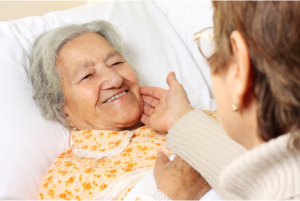 Caring For Dementia
Caring For Dementia
There’s No Place like Home
From the rectangle of sunlight that expands across the breakfast table each morning and the whoosh of the air vents as the heat cycles on, to fond memories of family happenings attached to every room in the house, home is a place of comfort and familiarity in so many ways. For a person with memory loss, research has shown that remaining in these familiar surroundings can play an important role in managing this disease.
You want to do what’s best for your loved one, and On Call Care Services is here to help make that possible.
Maximizing Quality of Life
Our approach of encouragement and assistance can help seniors cope with the challenges of dementia while enabling them to continue doing what they can on their own. This often involves using a series of easily understood cues and prompts, as well as maintaining a regular routine for the person with Alzheimer’s disease or related dementia, to reduce confusion and frustration.
Caregivers employed by our office also help by: Maintaining a safe environment- Managing changing behaviors – Providing nutritious meals-Providing mind-stimulating activities – Creating social interaction supervising daily activities
Alzheimer’s Awareness
What is Alzheimer’s disease?
Alzheimer’s disease is a progressive and irreversible brain disease that slowly destroys brain cells, causing memory loss and problems with thinking and behaviors severe enough to affect one’s work, lifelong hobbies and social life. Alzheimer’s worsens over time, and it is fatal. Today, it is the sixth-leading cause of death in the United States.
Who is at Risk?
Normally, Alzheimer’s disease is diagnosed in people age 65 and older, although the less-prevalent early-onset Alzheimer’s can occur much earlier. Early-onset individuals may be employed or have children still living at home. Experts estimate that some 500,000 people in their 30’s, 40’s and 50’s have Alzheimer’s disease or a related dementia.
 Raising Awareness
Raising Awareness
Education and awareness about the importance of early detection, warning signs and what resources are available are critical in the fight against Alzheimer’s disease. Most people don’t know when forgetting becomes a serious health problem, but by putting off learning more, people may be diagnosed too late and miss the opportunity to get the best help possible.
Tips for Alzheimer’s Awareness
- Tip A: Always Encourage Independence. Allow the person with Alzheimer’s to complete as many things as possible by him/herself, even if you have to initiate the activity.
- Tip B: Arrange activities around your loved one’s mood. Choose the best times to do activities according to the part of the day when the person is usually at his/her best.
- Tip C: Create Structure. Plan daily activities to help provide structure, meaning, and a sense of accomplishment for the person with Alzheimer’s. It is always best to establish a routine with which the person can become familiar.
- Tip D: Make Conversation Simple. Choose simple words and short sentences. Use a gently, calm tone of voice and try to frame questions and instructions in a positive way. If the person with Alzheimer’s is struggling to find a word or communicate a thought, gently try to provide the word he or she is looking for. Avoid talking to the person with Alzheimer’s like a baby or talking about the person as if he or she weren’t there.
- Tip E: Always Try And Reduce Frustrations. A person who has Alzheimer’s may react with frustration, agitation, and even aggression when tasks that were once second nature become increasingly difficult or impossible. To alleviate frustrations, try to stick to a schedule, be patient, limit choices, provide simple instructions and reduce distractions.
- Tip F: Seek Support. Seek out support from the Alzheimer’s Association or other local Alzheimer’s support groups for information and support.
- Tip G: Stay active. Urge your loved one to continue hobbies they enjoy, whether it’s gardening, dancing, painting, volunteering, playing sports or card games. Your loved one will benefit from the mental and social stimulation.
- Tip H: Keep track of medications. Ensuring your loved one is taking their Alzheimer’s medications is very important. Consider using a pill organizer for the medications.
- Tip I: Take safety measures. Make home safety improvements, such as installing grab bars in the bathroom and non-slip rugs in hallways. Use appliances that have an automatic shut-off feature.
- Tip J: Use memory aides. Labels, lists, notebooks and sticky notes can help your loved one cope with memory loss. Label drawers, and keep important phone numbers by the phone. Post reminders to lock doors or shut windows, and have step-by-step instructions on how to work appliances or complete routine tasks.
Helpful Links
- Alzheimer’s Associationhttp://www.alz.org
- MayoClinichttp://www.mayoclinic.com
- About.comhttp://www.alzheimers.about.com
- U.S. National Library of Medicinehttp://www.ncbi.nlm.nih.gov
- Alzheimer’s Foundation of Americahttp://www.alzfdn.com
- WebMDhttp://www.webmd.com
